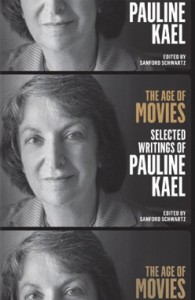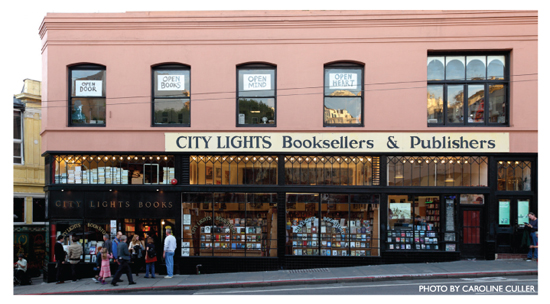The Age of Movies: Selected Writings of Pauline Kael

For conservatives, New Yorker film critic Pauline Kael is notorious for her comment of astonishment when Richard Nixon won the 1972 presidential election since, as she remarked, “everyone I know voted for McGovern.”
Despite this prime example of the liberal whose worldview is confined to a Martha’s Vineyard soiree, she was not usually so blinkered. While the Left of the early ’70s was lionizing blacklist era screenwriters and filmmakers like Dalton Trumbo and Lillian Hellman, Kael denounced them as joyless agitprop merchants whose politically correct comedies sank the screwball genre. She characterized their Hollywood descendants such as Robert Redford and Warren Beatty as creatively imprisoned by limousine liberalism.
Her ability to alienate both sides is all the more remarkable when one considers that these offenses occurred during the era of the “Silent Majority” and the New Left. Writers have compared Kael to such legendary film critics as James Agee and Otis Ferguson. Fellow critic Owen Gliebman even called her “the Elvis or the Beatles of film criticism.” But the figure she has the most in common with is George Orwell. Both warred against ideological fashion. Both approached their topics empirically and not with any preconceived theories. Both were willing to find value in pulp (Orwell in post-war boys’ weeklies with names like Modem Boy, Wizard, and Hotspur, Kael in Michael Keaton’s Batman). Both were uncomfortable with immorality: Orwell famously described Salvador Dali’s autobiography as a “book that stinks;” Kael’s condemnation of The Exorcist for the filmmaker’s willingness to exploit a thirteen-year-old actress and the script’s instructions for the priests to abuse her character mirrored the sentiments of conservative Christians at the time. In fact, Kael’s negative review of Stanley Kubrick’s A Clockwork Orange could have been written by Orwell himself:
At the movies, we are gradually being conditioned to accept violence as a sensual pleasure. The directors used to say they were showing us its real face and how ugly it was in order to sensitize us to its horrors. You don’t have to be very keen to see that they are now in fact de-sensitizing us. They are saying that everyone is brutal, and the heroes must be as brutal as the villains or they turn into fools.
There seems to be an assumption that if you’re offended by movie brutality, you are somehow playing into the hands of the people who want censorship. But this would deny those of us who don’t believe in censorship the use of the only counterbalance: the freedom of the press to say that there’s anything conceivably damaging in these films—the freedom to analyze their implications. If we don’t use this critical freedom, we are implicitly saying that no brutality is too much for us—that only squares and people who believe in censorship are concerned with brutality.
Kael never even attempted to be hip. She was old-fashioned enough to appreciate the charm of Cary Grant and to lament that Richard Lester’s gritty and wised-up 1973 version of The Three Musketeers didn’t even attempt heroism. Her ideology—which she described herself as George McGovern liberal—didn’t prevent her from finding vigilante films appealing, such as 1973’s Walking Tall, and locating that appeal in fears for her own safety in Miranda America.
It is this combination of refusing to be one with the herd and relentless honesty that makes The Age of Movies: Selected Writings of Pauline Kael—including reviews of other dated films like Billy Jack and The Poseidon Adventure—so timeless.
Nothing in her background could have indicated such iconoclasm. In Brian Kellow’s excellent biography, A Life in the Dark, we see Kael as a Berkeley dropout in 1936 during the heyday of American Communism. From there, she migrated to Greenwich Village in New York City before returning to that most bohemian of cities, San Francisco. She was hired on the spot by City Lights when an editor heard her discussing film and asked her to review Charlie Chaplin’s Limelight. One might have predicted that she would have drawn on her Berkeley experiences in approaching Chaplin, the darling of leftist intellectuals. But Limelight, which she referred to as “Slimelight,” was in her view a sickeningly sentimental film, not an expression of the superstructure. This recoil from crowd-pleasing pablum continued through the sixties. The Sound of Music, Kael wrote in a 1966 review, was “a sugarcoated lie that people seemed to want to eat.”

Even her writing process defied the tune-in-drop-out zeitgeist. Kellow’s biography shows a workaholic fueled by coffee and liquor, an anti-elitist who attended movies with the crowds rather than on nights set aside exclusively for the critics. Despite working at the stately New Yorker she was irreverent to the point of self-destructiveness; she could be depended upon at glittering parties to insult whoever was the publisher’s pet celebrity of the moment.
Kael’s determination as a critic to be one against the herd sometimes meant that films she denounced later became classics, and others she championed failed to age well. It almost felt like a reflex, a form of mindless rebellion when she raved about Straw Dogs, The Warriors, and Man of La Mancha (with a singing Sophia Loren) while roasting It’s A Wonderful Life and Raiders of the Lost Ark.
Still, in today’s culture-war climate, where every reviewer has to be a pundit, reading Kael’s work is refreshing. It’s hard to imagine her praising someone like Michael Moore; one can imagine her saying his filmmaking resembles those religious documentaries that preach to the faithful. She may even have ended her review, as she frequently did, with an insult. Sadly, Kael’s brand of entertainment and relentless honesty is something of the past.
